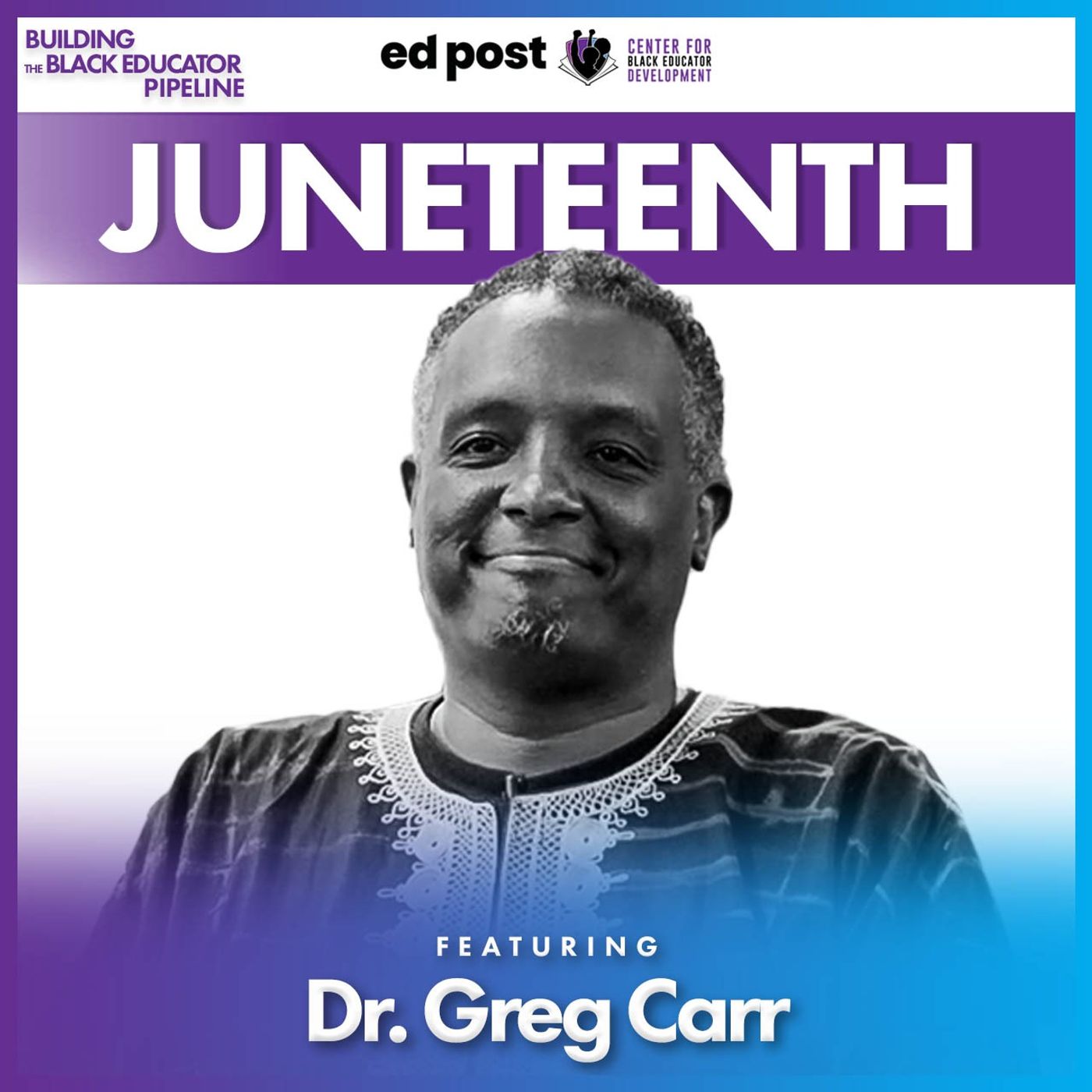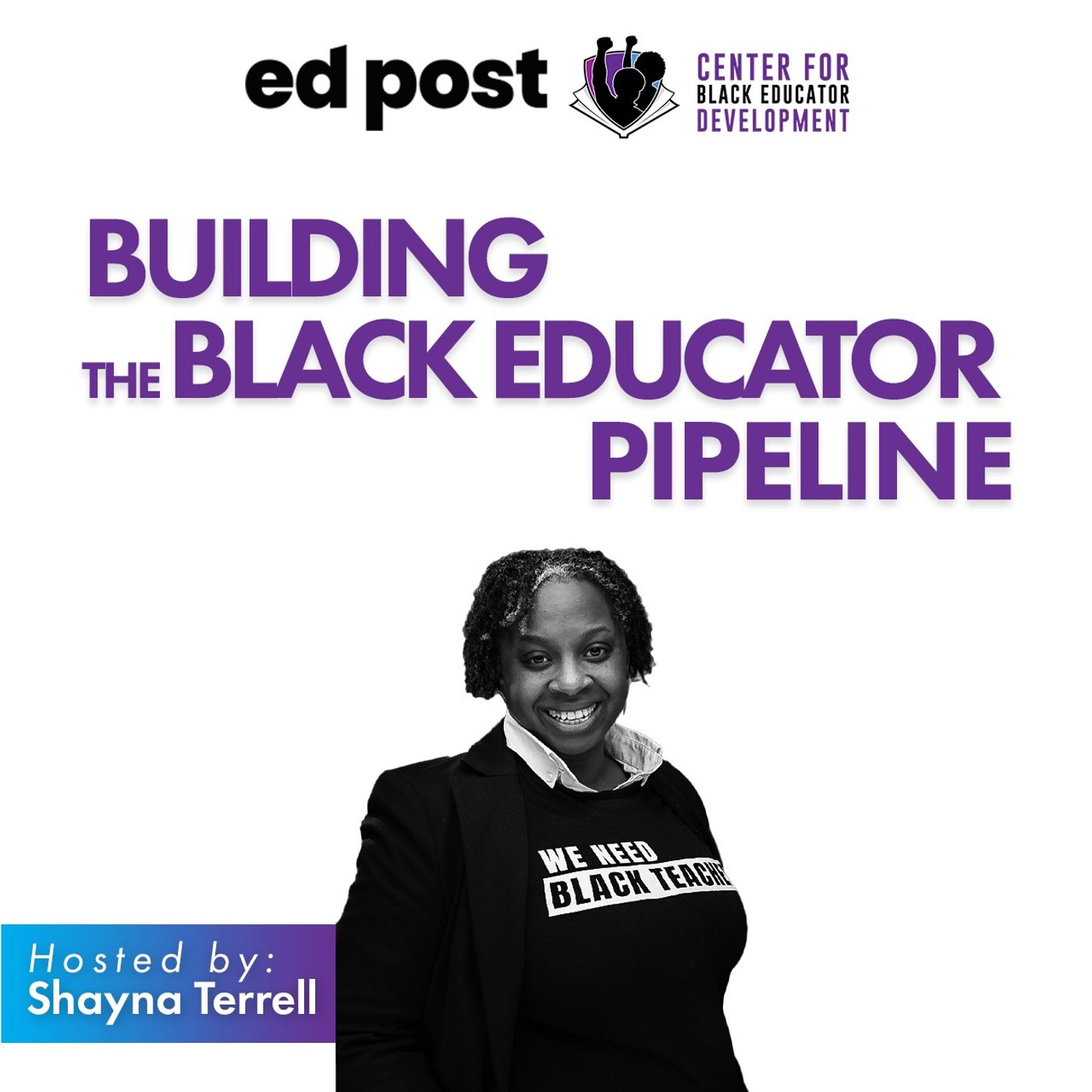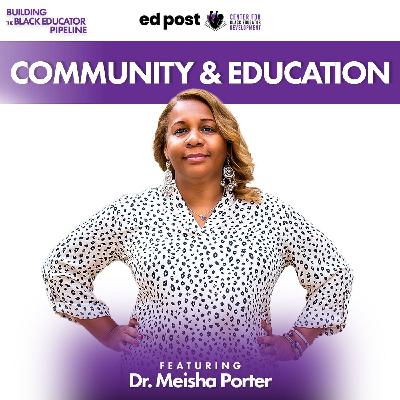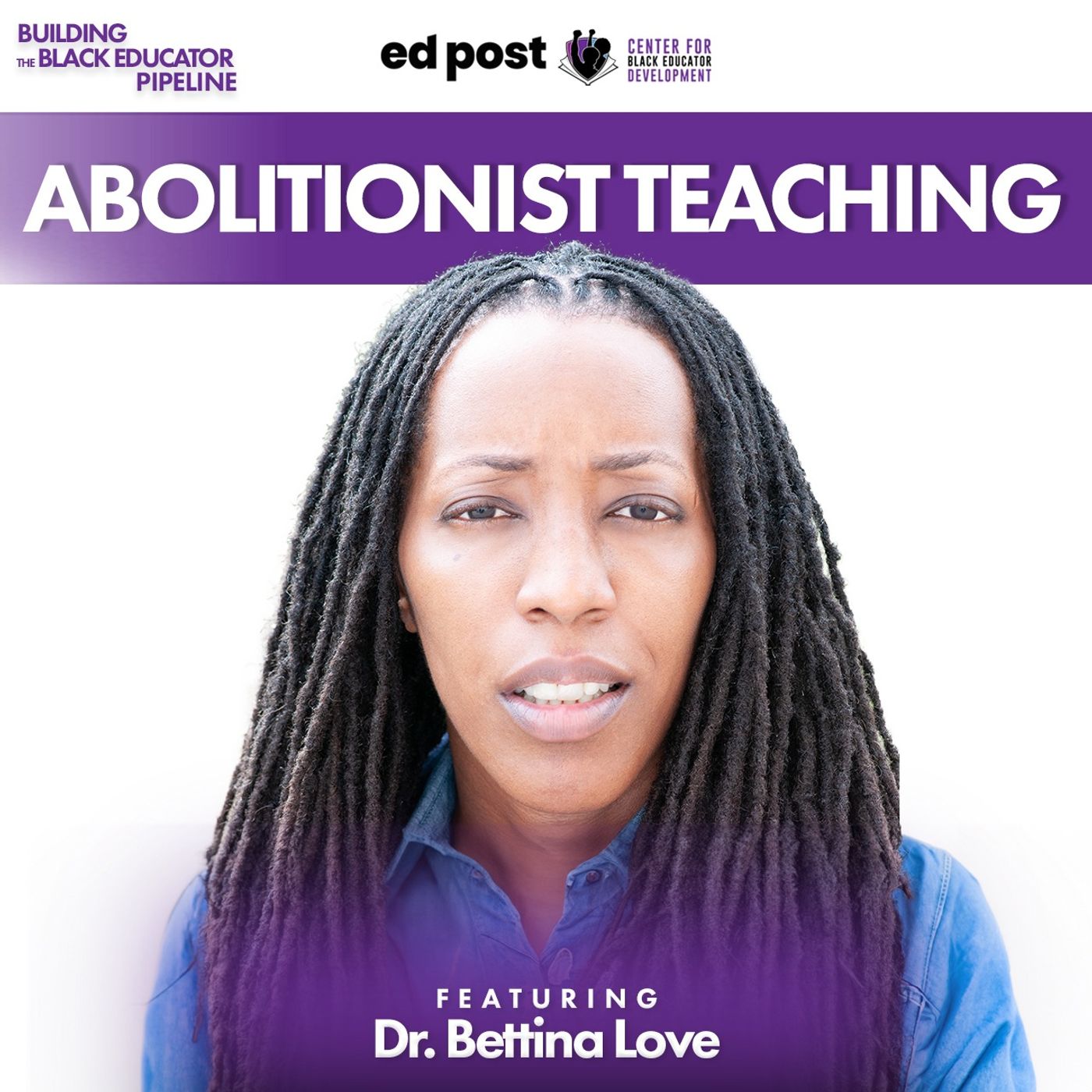Discover Building the Black Educator Pipeline
Building the Black Educator Pipeline

Building the Black Educator Pipeline
Author: Ed Post, Center for Black Educator Development
Subscribed: 12Played: 210Subscribe
Share
Description
Brightbeam and the Center for Black Educator Development combine forces to deliver the essential podcast on developing a strong Black Educator Pipeline to ensure our students have the representation they deserve.
72 Episodes
Reverse
Dr. Greg Carr and Shayna Terrell discuss the significance of Juneteenth. They explore the holiday's history, its meaning to Black folks, and the importance of remembering and celebrating the day. They also touch on the commercialization of Juneteenth and the need for critical thinking and understanding of its true significance. Juneteenth is a symbol of black self-determination and a recognition of the blood sacrifice of black people. Juneteenth should be globally celebrated as a marker of black history and resilience.
Renee Moore, an award-winning educator and recipient of the 2001 Mississippi Teacher of the Year award, shares her experiences as a long-time Black educator in the south. Renee discusses the challenges within the current education system, the importance of making learning engaging and relevant, and the impact of culturally responsive teaching. She provides insights into her innovative approaches to teaching, demonstrating how education can be a powerful tool for empowerment and advancement. Join us for an inspiring conversation on the need for systemic change and the potential for all students to excel in school.
In this special roundtable edition of Building the Black Educator Pipeline, we explore the reasons for the underrepresentation of people of color in math and technology fields. Our expert panel discusses the belief gap, the lack of competent teachers for Black students in America, and the role of technology in supporting student learning. The panel highlights responsibility of teachers to use technology effectively and the need for continuous professional development. The conversation emphasizes the importance of addressing equity issues in math education while leveraging technology to enhance learning experiences. The conversation also explores the role of technology, specifically AI, in education and how it can make teacher jobs easier and more efficient.
Dr. Tony Watlington, Superintendent of the School District of Philadelphia, joins the show to discuss the importance of building a diverse, high-quality teacher workforce and why representation is so important for our kids. He shares his background and passion for creating life-changing opportunities for students and his vision for making the Philadelphia's school district the fastest improving in the country. He emphasizes the importance of valuing and supporting all school employees and highlights initiatives to address the decline in the teacher pipeline. He also discusses the need for effective recruitment and retention strategies to find and support effective educators.
SummaryDr. Stacey Holland, Executive Director of Elevate 215, discusses the importance of philanthropy in education and shares her personal journey as a struggling learner with educators playing a crucial role in her success. She shares her experience in the philanthropy sector and the importance of telling stories to create meaningful impact. Dr. Holland emphasizes the need for diverse and inclusive learning environments that cater to the individual needs of students. She challenges the traditional approach to education and advocates for a focus on the process of learning. TakeawaysThe importance of diverse and inclusive learning environments that cater to the individual needs of studentsThe power of storytelling in creating meaningful impactThe role of educators in supporting and inspiring studentsPrivate philanthropy relies heavily on relationships and networking. Black-led organizations often face challenges in accessing funding and support.Articulating impact and producing results are crucial for attracting donors. Long-term planning and fundraising are crucial for the success of black-led organizations.Building relationships with funders and articulating the organization's mission and goals clearly are key to securing funding.Fundable projects are those that have a clear problem statement, a well-defined plan of action, a realistic budget, and measurable outcomes.
Show Notes:Shayna Terrell interviews Akil Parker, CEO of All This Math, about the importance of math in the black community. They discuss how math can be a tool for liberation and critical thinking, as well as the evolution of math education. Akil emphasizes the connection between math and problem-solving, and how math can empower individuals and communities. The episode highlights the role of math in black history and its significance in ancient civilizations like Kemet. This conversation explores the importance of math and math literacy, highlighting its application in everyday life and financial matters. Akil also breaks down the concept of Histematics, which connects math and history.TakeawaysMath is a tool for liberation and critical thinking in the black community.Mathematics is essential for problem-solving and developing analytical skills.Math literacy is equally, if not more important, than English language literacy, especially in financial matters.There is a strong connection between math and black history that should be explored and celebrated.Positive math education experiences and mentorship are crucial for students' success in math."Histematics" which combines math and history, can provide a deeper understanding of both subjects.Black mathematicians and their contributions should be recognized and celebrated.
Ernest Crim III, a former high school educator and viral Black history influencer joins the show to discuss the importance of teaching history, the role of black educators, and the challenges of combatting a Eurocentric curriculum. Mr. Crim shares his journey to becoming an educator and his motivation to connect young people to black history. He also discusses his success on social media and the importance of reaching young people with positive and truthful content. The discussion highlights the lack of historical knowledge and education for young people, the importance of intergenerational spaces and African worldview, and the absence of comprehensive Black history education in schools.
Shayna Terrell and Dr. Greg Carr are here to help you out this Black History Month.They highlight the contributions of Carter G. Woodson, the founder of what is now Black History Month, and emphasize the importance of black educators in preserving and teaching black history. They also discuss the lives of black historians and the need for black institutions to uplift the community. The conversation emphasizes the need to celebrate and learn from black history throughout the year, not just during the designated month. Shayna and Dr. Carr discuss the commercialization of Black History Month and the need to go beyond February to celebrate and teach Black history. They highlight the importance of addressing curriculum battles and book banning in education. They also explore the challenges of the future, including the impact of technology and social media algorithms on society. They stress the need to merge past and present history in education and flood airwaves with Black history to combat erasure.TakeawaysBlack History Month was founded by Carter G. Woodson to emphasize the study and celebration of black history. Today's Black educators play a crucial role in preserving and teaching black history.Black historians, such as Woodson and W.E.B. Du Bois, often returned to their communities to uplift and educate.Black institutions are essential for building and supporting the black community.Black History Month should serve as a reminder to celebrate and learn from black history throughout the year. Black History Month has become commercialized, with some individuals and organizations profiting from it.Black history should be celebrated and taught beyond the confines of February.We should be focused on the evolution of technology, social algorithms, and how "content" is fed to us. Merging past and present history is essential to provide a comprehensive understanding of the world.
Isaiah Thomas discusses the intersection of education and politics, emphasizing the need for increased funding and support for schools. He shares his personal journey in education, highlighting the impact of mentorship and programs like Freedom Schools. Thomas emphasizes the importance of teachers and mentors in shaping the lives of young people and calls for higher wages for educators. He also discusses the role of the federal government in education and the need for systemic changes in how schools are funded. Thomas concludes by urging listeners to participate in elections and support candidates who prioritize education.TakeawaysMentorship and programs like Freedom Schools can have a profound impact on young people, shaping their future aspirations and instilling a sense of service.Teachers and mentors have the power to make a lasting impression on students, not just through academic instruction, but also by how they make students feel.The intersection of education and politics is crucial, as elected officials have the power to allocate resources and make decisions that directly impact schools and students.Higher wages for educators are necessary to attract and retain talented individuals in the teaching profession.The federal government should provide more funding and support for education, including addressing capital deficits and investing in innovative approaches to learning.Changing the funding model for schools, particularly by increasing resources and making education a top priority, can lead to better outcomes for students.Individuals should participate in elections and support candidates who prioritize education and are committed to improving the education system.
Host Shayna Terrell celebrates the birth of the young king Adonis, and returns to her hosting duties on the Black Educator Pipeline Podcast, speaking with returning guest Dr. Greg Carr ahead of MLK day 2024.The two discuss how the same sanitized, whitewashed stories get told on this holiday every year, as well as discussing how we can best start the new year while fighting for the education and liberation of our Black students. What should we be most concerned with in 2024? What do we need to leave behind in 2023 and how do we continue the beautiful struggle and resistance in building a better world? Dr. Carr (Associate Professor of Afro-American Studies at Howard University) helps us answer these questions in the return of BTBEP.
Michael SimmonsMichael Simmons has been a domestic and international human rights activist for 60 years. Beginning as an organizer for the Student Nonviolent Coordinating Committee and later as Director of European programs for the American Friends Service Committee, Michael’s work has taken him to Africa, Asia, Europe, and the Middle East. For 18 years, he co-founded and ran the Ráday Salon, an independent human rights learning and discussion program in Budapest, Hungary. He also taught courses on African American History and US Elections at the Budapest campus of McDaniel College.Gwendolyn Zoharah Simmons, Ph.DDr. Simmons is a retired Professor Emerita in African American and Religious Studies and affiliated Faculty in Women Studies at the University of Florida. She obtained her BA from Antioch University in Human Service, her MA in Religious Studies & her Ph.D. in Islamic Studies from Temple University in Philadelphia, Pa.Simmons became active in the Civil Rights Movement during her freshman year at Spelman College in Atlanta, Georgia in 1962. She became a SNCC (Student Non-Violent Coordinating Committee) field secretary two years later in the summer of 1964 when she joined hundreds of other college-age volunteers who traveled to Mississippi to work in the Mississippi Freedom Summer Project. Since her years with SNCC, Simmons has served as an organizer with the National Council of Negro Women, serving as their Mid-West Field Director for their Project Woman Power and later with the American Friends Service Committee, where she held a number of program and administrative jobs for over 20 years.
Freedom School Literacy Academy Junior Servant Leaders are taking over Building The Black Educator Pipeline Podcast for the day. We hear from current high school students who have joined the movement for liberation and discuss their Freedom Summer ’23 experience and current events.
'Servant Leader Apprentices' from Freedom School Literacy Academy are taking over the Building the Black Educator Pipeline Podcast for the day. We hear from current college students who are future educators in the field discussing Freedom Summer ‘23 and current events.
From armed revolutionaries to revolutionary artists! In this throwback episode, Shayna was joined by two Black Panthers, Baba Jamal Joseph and Baba Zayid Muhammad to discuss all things art, activism, history, and education.
Dr. James D. Anderson, the renowned author of The Education of Blacks in the South 1860-1935, and Professor Emeritus of Education at the University of Illinois Urbana-Champaign, joins Building the Black Educator Pipeline to discuss the history of Black education in this country.Dr. Anderson's scholarship focuses broadly on the history of U.S. education, with a subfield in the history of African American education. In this episode, he shares what inspired him to become a researcher into the history of Black education and his own life journey. He shares the history of Black people working to build their own system of education and the obstacles they faced along the way. Host Shayna Terrell and Dr. Anderson discuss competing educational philosophies for Black folks in the South, and how we see some of the same debates in modern discourse. They discuss the politics that went along with fighting for improved education for Black students and compare the current state of education with the past. Finally, Dr. Anderson shares what he believes is leading to the attacks on African-American studies, as well as the increase in book bans, and censorship of certain curriculums throughout the country. James D. Anderson is Edward William and Jane Marr Gutgsell Professor Emeritus of Education at the University of Illinois Urbana-Champaign.In 2021, Anderson was elected to the American Academy of Arts and Sciences, one of the oldest honor societies in the nation. He was sworn into the Board of Trustees at Stillman College in Tuscaloosa, Alabama, and inducted into the Stillman College Educator Hall of Fame—both in 2020.Additionally, the AERA awarded him a Presidential Citation in 2020, its highest award. In 2012, Anderson was selected as a Fellow for Outstanding Research by the AERA and received the Lifetime Achievement Award from the American Association of Colleges for Teacher Education. Anderson was also elected to the National Academy of Education in 2008.
Dr. Meisha Porter, President and CEO of The Bronx Community Foundation and former Chancellor of NYC Public Schools joins us to discuss the importance of community support in education.
Dr. Bettina Love is an educator who teaches, writes, researches, and advocates at the intersection of racism, education, and abolition. She is the author of the book We Want To Do More Than Survive: Abolitionist Teaching and the Pursuit of Educational Freedom. Dr. Love joins the show to discuss what abolitionist teaching means to her, and the work of the Abolitionist Teaching Network, whose mission is "to develop and support those in the struggle for educational liberation by utilizing the intellectual work and direct action of Abolitionists in many forms." She also shares what inspired her to write her new book “Punished for Dreaming.”Dr. Love and host Shayna Terrell discuss the education reform movement and what it will take to achieve educational equity. They also consider what education reparations could look like and how we can advocate for them. Finally, Bettina shares how hip-hop can be implemented into education and how schools can be more inclusive of diverse populations. Dr. Bettina Love:Dr. Bettina L. Love is the William F. Russell Professor at Teachers College, Columbia University and the bestselling author of We Want To Do More Than Survive. In 2022, the Kennedy Center named Dr. Love one of the Next 50 Leaders making the world more inspired, inclusive, and compassionate. A co-founder of the Abolitionist Teaching Network (ATN), whose mission is to develop and support teachers and parents fighting injustice within their schools and communities, they have granted over $250,000 to abolitionists around the country. She is also a founding member of the Task Force that launched the program In Her Hands, distributing more than $15 million to Black women living in Georgia. In Her Hands is one of the largest guaranteed income pilot programs in the U.S. Dr. Love is a sought-after public speaker on a range of topics, including abolitionist teaching, anti-racism, Hip Hop education, Black girlhood, queer youth, educational reparations, and art-based education to foster youth civic engagement. In 2018, she was granted a resolution by Georgia's House of Representatives for her impact on the field of education. You can preorder her new book Punished for Dreaming: How School Reform Harms Black Children and How We Heal wherever books are sold.
Dr. Greg Carr, associate professor of Africana Studies and chair of the Department of Afro-American Studies at Howard University rejoins the Building the Black Educator Pipeline Podcast to give us a history lesson on the life and legacy of Martin Delany. Dr. Carr explains why Delany is considered an icon in Black nationalist thought and contrasts him to modern-day activists.Dr. Carr and host Shayna Terrell discuss the connection to academic work in today's social movements and lay out strategies that ancestors would have used to address the crisis of education and curriculum today. Dr. Carr gives his thoughts on the movement to ban books and exclude topics from the curriculum in schools and the effort to erase parts of our history. Shayna and Dr. Carr talk about how we can get students active in engaging with these education bills across the country. They also discuss the NAACP's recent "travel advisory" to Florida, calling the state hostile to Black Americans.
Dr. Donna Y. Ford, a distinguished Professor of Education and Human Ecology and Kirwan Institute Faculty Affiliate at The Ohio State University's College of Education and Human Ecology, stops by Building the Black Educator Pipeline to discuss Multicultural Gifted Education.
Co-Founder and President of the National Parents Union, Keri Rodrigues, and Deputy Director of Parent Voice and Outreach, Maritza Guridy, join the show to discuss the impact of parents on the education system and the importance of parent-centered spaces in education.























